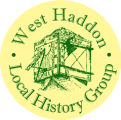The Drinking Man’s History of West Haddon.
Early village brewers.
On Tuesday 10th October 1581 the villagers assembled for the autumn business of West Haddon Manor Court. Thomas Andrewe, the Lord of the Manor, was absent, so his steward Charles Dyxwell presided. A number of villagers were absent too, and were fined for their negligence. The jury, twelve village men of some standing in the community, heard the charges against people who had transgressed the local byelaws since the April Court. The first brewers / alekeepers shown as recorded in West Haddon were Robert Newman and John Lynnell who both paid fines for transgressing local byelaws (Assize of Ale) in October 1581.
These are the first two West Haddon brewers we know by name, but there must have been people producing alcoholic beverages here for centuries before this. In 1303, when the climate was a little milder than it is now, Emma of Watford, was granted leave to enclose her vineyard. So perhaps in the Middle Ages beer and ale were not the only locally produced options for drinking.
By 1581 we have evidence for two alehouses in West Haddon, but they were unlikely to have been full-time businesses. When Robert Newman made his will in 1612, he described himself as a blacksmith. But despite the availability of ale for sale many village households continued to brew their own for generations after this time. We find evidence for this in village wills. In 169 Mary, widow of Thomas Elmes left “one of my drink barrels to my daughter Joan, the other to my son William.” While John Bosworth, a farmer, a few years later left “all the household goods to my wife Elizabeth, except the garner, the long table and the drink hogshead which I give to my eldest son John”.
In 1758 John Hipwell, a weaver with great faith in the harmonious relationship between brother and sister, left “my brewing kettle to my son Richard and my Daughter Elizabeth, for each to have the use of it when they want it.” And at the end of that century, in 1796, Thomas Smith, a wealthy grazier mentioned his brewing utensils among the household goods he bequeathed to his son.
Alehouses continued as part time affairs in the village and many villagers continued to brew their own ale for centuries after this time. In 1630 Alehouse licences were granted to three villagers: Henry Newman, Roberts son who carried on the family interest in brewing, Thomas Jenoway and Isabel Murcote. Perhaps one of them operated on the marketplace, where refreshment would be welcome to visiting buyers and sellers, and where the alehouse could provide a public place, out of the weather, for settling deals before witnesses. Much later, in 1781 we find an instance of a public house fulfilling this sort of function when Benjamin Dames, a grazier, left an annual allowance to his wife.
...to be payable to her at or in some inn or public house within the parish of West Haddon. (Also, all the household goods to my son Thomas, he to provide my wife sufficient firing and beer during her life and also one flitch of bacon yearly).
